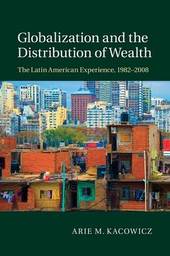
|
Globalization and the Distribution of Wealth: The Latin American Experience, 1982-2008
Paperback / softback
Main Details
| Title |
Globalization and the Distribution of Wealth: The Latin American Experience, 1982-2008
|
| Authors and Contributors |
By (author) Arie M. Kacowicz
|
| Physical Properties |
| Format:Paperback / softback | | Pages:262 | | Dimensions(mm): Height 230,Width 152 |
|
| Category/Genre | Development economics
Political economy |
|---|
| ISBN/Barcode |
9781107499744
|
| Classifications | Dewey:337.8009049 |
|---|
| Audience | | Professional & Vocational | |
|---|
| Illustrations |
16 Tables, black and white; 8 Line drawings, unspecified
|
|
Publishing Details |
| Publisher |
Cambridge University Press
|
| Imprint |
Cambridge University Press
|
| Publication Date |
9 April 2015 |
| Publication Country |
United Kingdom
|
Description
The effects of globalization on poverty and inequality are a key issue in contemporary international politics, yet they have been neglected in international relations and comparative politics literatures. Arie M. Kacowicz explores the complex relationships between globalization and the distribution of wealth as a political problem in international relations, analyzing them through the prism of poverty and inequality. He develops a political framework (an 'intermestic model') which captures the interaction between the international and the domestic domains and explains those effects with a particular emphasis upon the state and its relations with society. He also specifies the different hypotheses about the possible links between globalization and the distribution of wealth and tests them in the context of Latin America during the years 1982-2008, with a particular focus on Argentina and the deep crisis it experienced in 2001-2.
Author Biography
Arie M. Kacowicz is Associate Professor in the Department of International Relations at the Hebrew University of Jerusalem.
Reviews'In his provocative and well-written book, Arie Kacowicz argues that the impact of globalization on inequality is mediated by national governments. Through a compelling analysis of Argentina's responses to globalization, he demonstrates that social issues like inequality improve when a country's government is strong relative to its society. In short, greater governance leads to greater social good. This book is recommended to all interested in issues of globalization, inequality, economic development, Argentina, and the comparative politics of Latin America.' George Shambaugh, Georgetown University
|